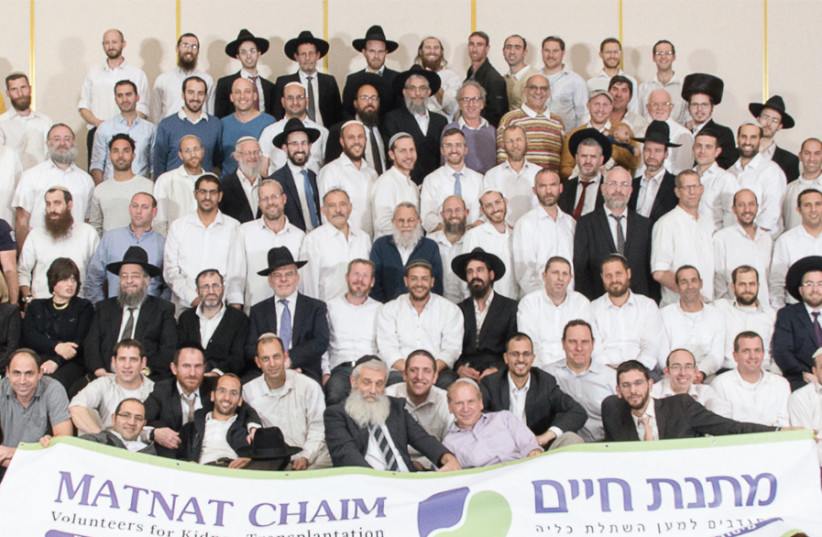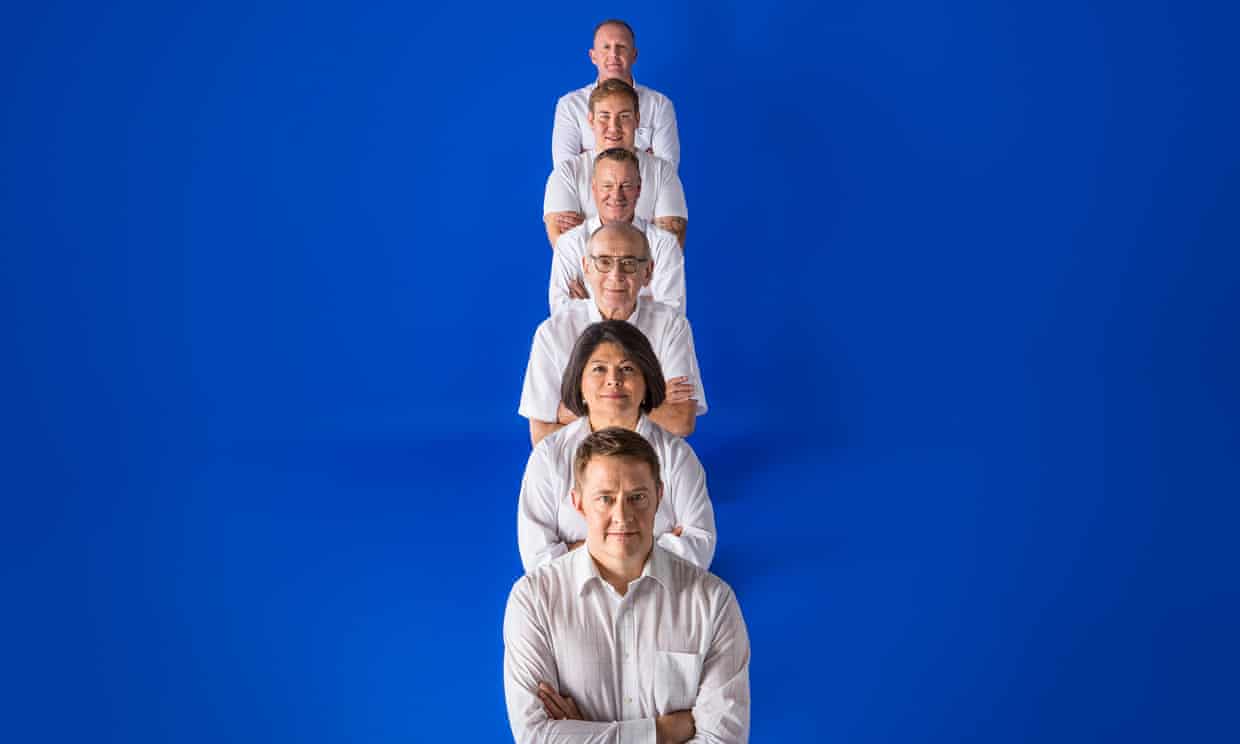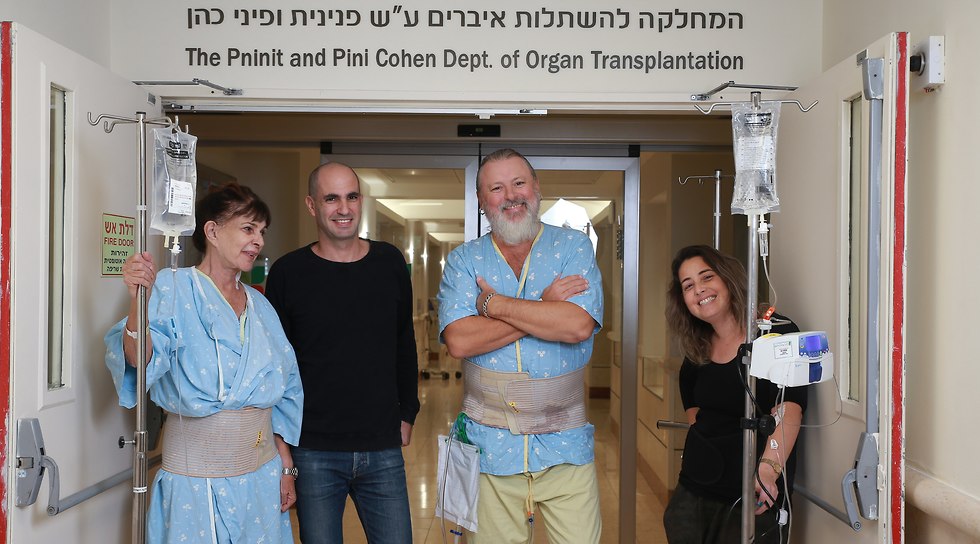Israel leads the world in per capita living kidney donation. A good part of that comes from the work of Matnat Chaim (gift of life), an organization of religious Jews, who donate kidneys to people they don't know. They are "semi-directed" rather than non-directed donors, in that the organization allows them to indicate some criteria they would like their recipients to have. Sometimes they want their recipients to be fellow Jews, and this has generated some controversy in Israel.
Below is a study of this phenomenon, and in an accompanying editorial, a criticism of it.
Nesher, Eviatar, Rachel Michowiz, and Hagai Boas. "Semidirected Living Donors in Israel: Sociodemographic Profile, Religiosity, and Social Tolerance." American Journal of Transplantation (in press).
Abstract: Living kidney donations in Israel come from 2 sources: family members and individuals who volunteer to donate their kidney to patients with whom they do not have personal acquaintance. We refer to the first group as directed living donors (DLDs) and the second as semidirected living donors (SDLDs). The incidence of SDLD in Israel is ∼60%, the highest in the world. We introduce results of a survey among 749 living donors (349 SDLDs and 400 DLDs). Our data illustrate the sociodemographic profile of the 2 groups and their answers to a series of questions regarding spirituality and social tolerance. We find SDLDs to be sectorial: they are mainly married middle-class religious men who reside in small communities. However, we found no significant difference between SDLDs and DLDs in their social tolerance. Both groups ranked high and expressed tolerance toward different social groups. Semidirected living donation enables donors to express general preferences as to the sociodemographic features of their respected recipients. This stirs a heated debate on the ethics of semidirected living donation. Our study discloses a comprehensive picture of the profile and attitudes of SDLDs in Israel, which adds valuable data to the ongoing debate on the legitimacy of semidirected living donation.
Danovitch, Gabriel. "Living organ donation in polarized societies." American Journal of Transplantation, (Editorial, in press).
"Nesher et al are to be congratulated for reporting on a unique, effective, yet ethically problematic manifestation of living kidney donation in Israel. To summarize, living kidney donation has become “de riguer,” a “mitzvah” (a religiously motivated good deed) among a population of mainly orthodox Jewish men living in religiously homogenous settlements. According to the authors, the donors view themselves as donating altruistically within a larger family. The donations, over 1300 of them, 60% of all living donations in the country, have changed the face of Israeli transplantation, reduced the waiting time for all transplant candidates on the deceased donor waiting list,2 and minimized the temptation of Israeli transplant candidates to engage in “transplant tourism,” a phenomenon that was an unfortunate feature of Israeli transplantation before the passage of the Israeli Transplant Act of 2008 that criminalized organ trading.3
So, what’s the problem? Matnat Chaim (“life-giving”), the organization that facilitates the donations, permits the donors to pick and choose among a list of potential recipients using criteria that according to its own website,4 and as Nesher et al note,1 are not transparent. ... frequently the donors elect to donate to other Jews. ... " Israel is a country with an 80% Jewish majority; a decision to only donate to other Jews, thereby excluding non-Jews, is a practice that, were it reversed in a Jewish minority country, would likely be labeled antisemitic. Concern that the process encourages racist and nationalistic ideation has been raised in the past6 and only emphasized by the public pronouncement of some media-savvy kidney donors.7
"What lessons does the Israeli experience hold for the US and other countries, faced as all are, with a shortage of organs for transplant? Conditional living donation exists to a limited extent in the US: DOVE is an organization that works to direct living kidney donation to US army veterans9; Renewal is an organization that encourages and facilitates living donation from Jews to other Jews but also to non-Jews10; in the 1990s an organization called “Jesus Christians” made organ donation one of its precepts.11 But in each of these cases, it is a minority group whose interests are being promoted.
...
"What now for Matnat Chaim? Given its prominent impact on Israeli transplantation, its allocation policies must be transparent and subject to public comment. Criteria must be medical in nature and religious or political considerations excluded. Fears that as a result living kidney donation rates will plummet are likely exaggerated. "
########
I can't help reading this discussion while being very aware that Dr. Danovitch is an ardent opponent of compensating kidney donors, for fear that inappropriate transplants would take place if that were allowed. In much of that discussion, inappropriateness of transplants focuses on possible harm to the (paid) donors, but the donors in the Israeli case are unpaid. Here his concern is that donor autonomy about to whom to give a kidney comes at the expense of physician autonomy in choosing who should receive a transplant, by "medical" criteria. But frequently those criteria have a big component based on waiting time, rather than any special medical considerations. So maybe in general he thinks that privileging the physician's role in this way is worth having fewer organs and consequently more deaths.
Still, I think he has a point about how we perceive what is repugnant. Having minority donors donate to fellow minority recipients seems much less repugnant than having majority donors specify that they aren't interested in donating to minority recipients.
But, speaking of donor autonomy, I'm not sure that there are practical ways around it, since semi-directed donors could always present as fully directed donors to a particular person that some organization had helped them find. So, we may just have to live with the increase in donations and lives saved that donor autonomy can support.
########
Earlier posts:
Thursday, July 27, 2023
Kidney brouhaha in Israel: is a good deed still good when performed by a shmuck?
I ended that post with this:
"I'll give the last word to a Haaretz op-ed, also in English:
Monday, July 31, 2023
Altruistic kidney donors in Israel
Friday, March 12, 2021
Kidneys for Communities
" A new organization, Kidneys for Communities, plans to advocate for living kidney donation by seeking donors who identify with a particular community. Their come-on is "Put your kidney where your heart is. Share your spare with someone in your community"





